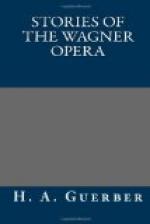His head suddenly sinks down upon her bosom, but, as her immobility continues, he experiences for the first time a faint sensation of fear. This is born of his love for her, and, in a frantic endeavour to recall her to life, he bends down and kisses her passionately. At the magic touch of his lips, Brunhilde opens her eyes, and, overjoyed at the sight of the rising sun, greets it with a burst of rapturous song ere she turns to thank her deliverer. The first glimpse of the hero in his glittering mail is enough to fill her heart with love, and recognizing in him Siegfried, the hero whose coming she herself has foretold, she welcomes him with joy. Siegfried then relates how he found her, how he delivered her from the fetters of sleep, and, impetuously declaring his passion, claims her love in return.
The scene between the young lovers, the personifications of the Sun and of Spring, is one of indescribable passion and beauty, and when they have joined in a duet of unalterable love, Brunhilde no longer regrets past glories, but declares the world well lost for the love she has won.
’Away Walhall’s
Lightening world!
In dust with thy seeming,
Towers lie down!
Farewell greatness
And gift of the gods!
End in bliss
Thou unwithering breed!
You, Norns, unravel
The rope of runes!
Darken upwards
Dusk of the gods!
Night of annulment,
Near in thy cloud!—
I stand in sight
Of Siegfried’s star;
For me he was
And for me he will be,
Ever and always,
One and all
Lighting love
And laughing death.’
These sentiments are more than echoed by the enamoured Siegfried, who is beside himself with rapture at the mere thought of possessing the glorious creature, who has forgotten all her divine state to become naught but a loving and lovable woman.
[Illustration: Siegfried and the Rhine maidens.]
DUSK OF THE GODS.
The Norns, or Northern goddesses of fate, are seen in the dim light before dawn, busily weaving the web of destiny on the rocky hillside where the Walkyries formerly held their tryst. As they twist their rope, which is stretched from north to south, they sing of the age of gold. Then they sat beneath the great world-ash, near the limpid well, where Wotan had left an eye in pledge to win a daily draught of wisdom.
They also sing how the god tore from the mighty ash a limb which he fashioned into an invincible spear. This caused the death of the tree, which withered and died in spite of all their care. The third Norn then continues the tale her sisters have begun, and tells how Wotan came home with a shivered spear one day, and bade the gods cut down the tree. Its limbs were piled like fuel all around Walhalla, the castle which the giants had built, and since then Wotan has sat there in moody silence, awaiting the predicted end, which can no longer be far distant.




